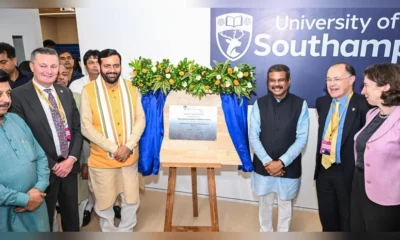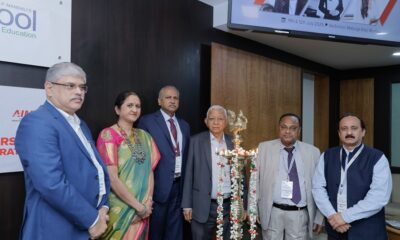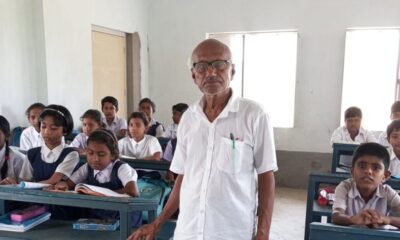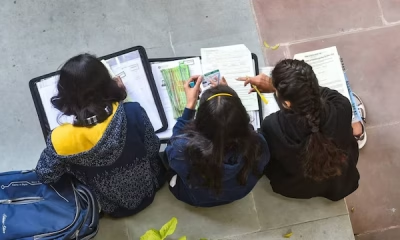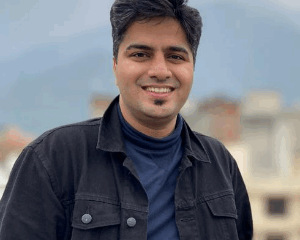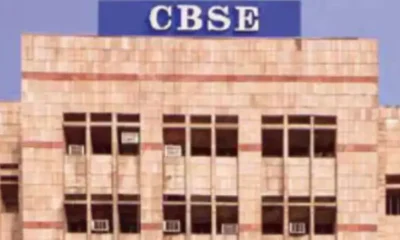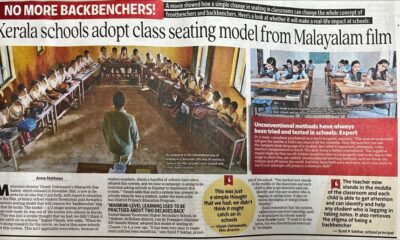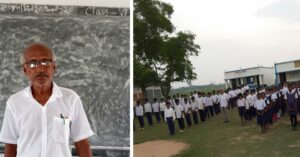Education
Education we impart must lead to self discovery, enlightenment and awakening of an individual: Vice President
The Vice President of India, Shri M. Venkaiah Naidu has said that the education we impart in our schools, colleges and universities must lead to self discovery, enlightenment and awakening of an individual.
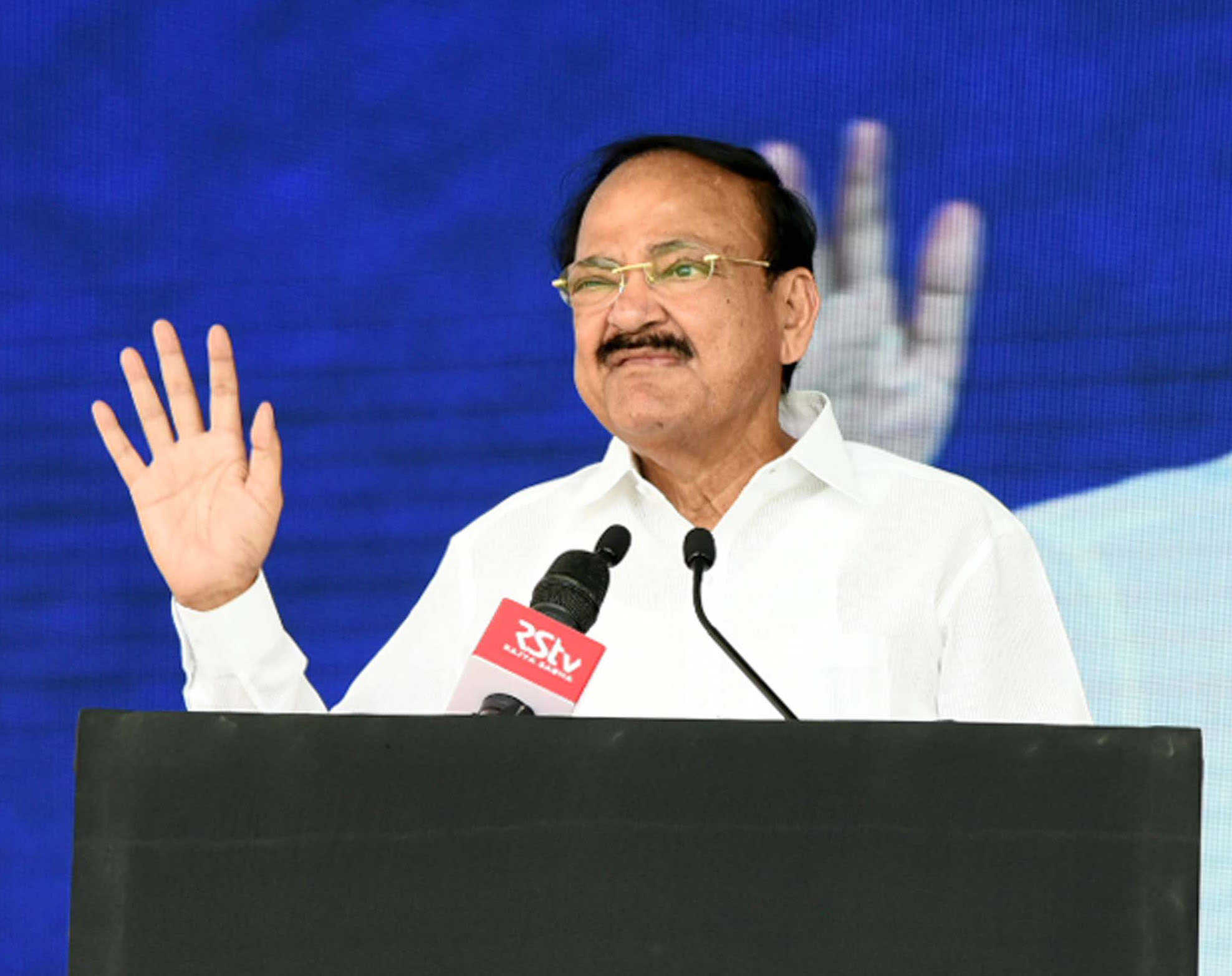
The Vice President of India, Shri M. Venkaiah Naidu has said that the education we impart in our schools, colleges and universities must lead to self discovery, enlightenment and awakening of an individual.
The Vice President said that by 2020, the median age in India will be just 28, compared to 37 in China and the US, 45 in Western Europe, and 49 in Japan. Demographics is a game changer in economic development and can transform the pace and pattern of economic growth, he added.
Shri Naidu said that investing in people through healthcare, quality education, jobs and skills helps build human capital. He further said that though India has made considerable gains in human development, it still grapples from challenges of illiteracy, big barriers to secondary schooling, low-quality public services, and gender discrimination. It is time for India to pursue a much more aggressive education plan, exploiting the new technology opportunities, he added.
The Vice President said that there should be renewed focus on gender equality and safety of women through gender sensitization and gender sensitization must begin at the home, schools and colleges. He urged the institution to do everything in its power to encourage more and more young women to avail opportunities of higher education.
Saying that even when jobs are available, candidates with the right skill set that fit the job are not available, the Vice President suggested to tackle this issue with the Pradhan Mantri Kaushal Vikas Yojna 2.0 which has been launched in October 2016 and aims to train 10 Million Youth over a period of 4 years.
Advising to pay attention to equity in access to education, the Vice President said that women and girls, Scheduled Castes and Tribes, differently-abled and minority groups need to have a barrier free and equitable access to higher education.
Quoting Swami Vivekananda's exhortation a hundred years ago – “Awake, arise and stop not till your goal is reached”, Shri Naidu said that this world is full of opportunities and one must seize them.
Following is the text of Vice President's address:
"My dear sisters and brothers, India is blessed with a huge demographic capital. By 2020, the median age in India will be just 28, compared to 37 in China and the US, 45 in Western Europe, and 49 in Japan. Demographics is a game changer in economic development and can transform the pace and pattern of economic growth. I believe that it is this energetic, inventive and enterprising youth population that will write India’s glorious story of prosperity. But a lot depends upon whether the bulge in working population can be properly educated and trained. India has to create enough jobs to employ the 10 million more people who are set to join the labor force every year. India has to invest more and more efficiently in people. Investing in people through healthcare, quality education, jobs and skills helps build human capital, which is key to supporting economic growth, ending extreme poverty, and creating more inclusive societies. Human capital is already the largest component of global wealth and one of the most crucial and fast growing components of India’s wealth. Many international agencies including the World Bank believe that India really has the potential to become the human resource capital of the world. Though India has made considerable gains in human development, it still grapples from challenges of illiteracy, big barriers to secondary schooling, low-quality public services, and gender discrimination. The Government of India has undertaken a number of proactive initiatives for the betterment of Higher Education in India. From the SWAYAM Prabha programme which takes high quality educational content to the most backward areas using satellite communication through 32 DTH channels to the National Digital Library (NDL) which is a virtual repository of learning resources, a number of innovative initiatives now define India’s Higher Education potential. Government has also embarked upon a mission to build several “Institutions of Eminence” (IoE) in public and private domain, so that they are rated among the best global institutions, propelling India to the status of being a favored destination to the world for Higher Education. We have also come up with a number of encouraging, out of the box ideas such as the Smart India Hackathon initiative that promotes innovation to find solutions for common problems faced by the society at large. It is time for India to pursue a much more aggressive education plan, exploiting the new technology opportunities including Massive Open Online Courses and virtual classrooms to the best possible extent. No country can achieve its potential and meet the daunting challenges of the 21st century without the full participation of working population, both women and men. Discrimination against women have a crippling impact on economic development. There should be renewed focus on gender equality and safety of women through gender sensitization. Gender sensitization must begin at the home, schools and colleges. I urge institutions to do everything in its power to encourage more and more young women to avail opportunities of higher education. It is time that we reassess and re-evaluate our approach and our strategy towards higher education. While we have considerably expanded our education system and more young people are in schools and colleges than ever before, there is clearly a crisis of quality. The learning attainment surveys speak of significant learning gaps. While India is home to a few world-class institutes that cater to higher education there are a large number of mediocre institutions that operate in our country. A massive ranking exercise, the National Institutional Ranking Framework (NIRF) was launched in 2015 for various categories of institutions such as Universities, Engineering colleges, Management Institutions etc. It is a decisive step in the direction of ushering in accountability and transparency in the higher educational institutions of India. Besides unemployment, India also faces a problem of unemployability. Even when jobs are available, candidates with the right skill set that fit the job are not available. To tackle this issue, the Pradhan Mantri Kaushal Vikas Yojna 2.0 has been launched in October 2016. It aims to train 10 Million Youth over a period of 4 years. Since its launch, it has trained and certified over 3.5 million young people. It is high time that we focus on vocational education in schools in addition with improving learning outcomes in reading, writing and basic Mathematics. The quality of education both in terms of the curriculum and teaching methodology also needs to be redefined and refined. We need to ensure that our youth are ready for the job market. We also need to equip them with the entrepreneurial skills to become job creators. We have to fully exploit the limitless possibilities of the digital revolution we are experiencing now to fortify our higher education. We must prepare our youngsters to ride this wave of technology and to harness its potential to the best possible extent. We also need to pay attention to equity in access to education. Women and girls, Scheduled Castes and Tribes, differently-abled and minority groups need to have a barrier free and equitable access to higher education. India is firmly committed to the ideals social justice and equitable opportunities to education become a crucial first step towards achieving social democracy. For our higher Educational Institutions to become centres of global excellence, we must constantly strive to promote autonomy and quality and create an enabling environment for educational institutions to chart their own paths to excellence. We must build meaningful collaborations with the best educational institutions from around the globe and seek to learn and adapt the best practices followed by them in teaching, research and curriculum to suit our needs. We have already launched the Global Initiative of Academic Networks (GIAN) an initiative to provide opportunities for Indian students & faculty to interact with the best academic and industry experts from around the world. Many more such partnerships have to be nurtured and fostered. We also have to invest a significant amount of resources in training teachers to make them highly competent. Our education sector is facing new challenges and we need teachers who are capable of rising to the occasion to effectively tackle these tests. While I agree that education should lead to employment and livelihood security, I do not believe that a job is the ultimate aim of education. We must ensure that the education we impart in our schools, colleges and universities leads to self-discovery, enlightenment and awakening of an individual. Education must empower the student in a holistic manner by ensuring all-round development of his/ her personality. Education must build a strong character, inculcate ethical and moral values and also impart essential life skills, apart from leadership qualities. Education should bring out the best in man and lead to his enlightenment and empowerment. It is an instrument for socio-economic transformation. Education is the process of continuous, lifelong learning and does not end with the acquisition of a degree."
"Dear students, Always aim and strive to achieve excellence in your chosen domain. Never get demoralized by temporary setbacks as every experience teaches a new lesson in life. Maintain equanimity in all situations, be confident but not arrogant. This world is full of opportunities. You must seize them. As Swami Vivekananda exhorted a hundred years ago- “Awake, arise and stop not till your goal is reached”. I urge you to do your best to mould global citizens who are well equipped to deal with any challenge that the competitive, fast paced world of the 21st century throws their way. I wish each and every one of you the very best in your future endeavours.
Thank You!
Jai Hind!"
Image Courtesy: pib.nic.in
Education
Lighting the Way, One Beam at a Time – Monika Banga
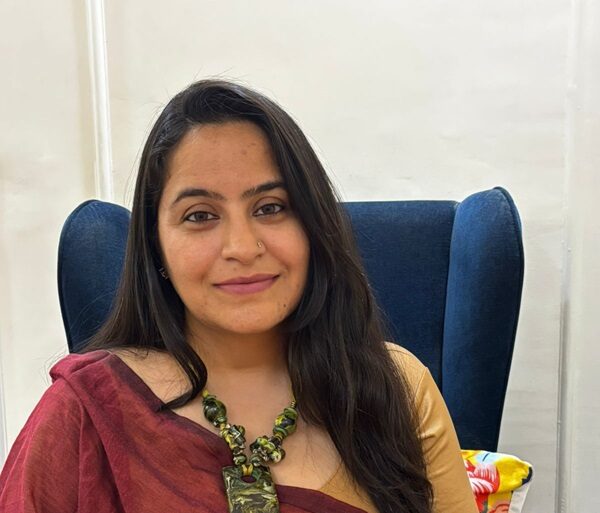
In the stillness of the COVID-19 lockdown—when the world hit pause and uncertainty gripped communities—Monika Banga quietly sparked something radical. Not radical in funding or scale, but in spirit. Born out of a moment of global stillness, The LightBeam Project wasn’t launched with loud declarations or big grants. It began as something far more intimate: a bridge between continents, classrooms, and possibilities.
But Ms. Monika’s journey didn’t start there. It began over a decade earlier, in under-resourced classrooms where she worked with children who had never known structured learning, or imagined speaking with someone from another country. With over 12 years of experience, she didn’t just teach—she listened. And what she heard, again and again, was a hunger not for food, but for discovery, belonging, and expression.
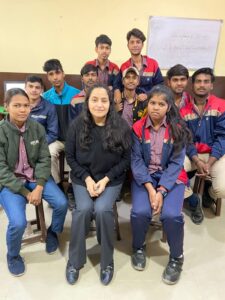
When the Granny Cloud initiative—a volunteer-driven project that connected retired educators with children—came to a close, Monika felt the silence it left behind. Along with her friend and fellow educationist Lesley Keast from Spain, she wondered: What if that spark of connection could be reignited? That one idea gave birth to The LightBeam Project. It began modestly: a handful of volunteers, one school, a few curious children, and shaky internet. But it carried a powerful belief: every child has the right to dream, and someone, somewhere, will listen.
Unlike traditional education interventions, LightBeam didn’t come with a manual. It came with open-ended conversations. Sessions inspired by SOLE (Self-Organised Learning Environments) nudged children toward self-discovery. Initially, the children were hesitant.
“They were used to answers, not questions,” Monika recalls.
But soon, wonder took over. They began asking: Why do we age? What if all insects disappeared? These weren’t sessions—they became rituals of curiosity.
As their questions deepened, so did their digital skills. Devices once used for distraction turned into tools of creation. Children began making digital presentations, recording videos, and sharing local traditions with volunteers across the globe. One girl proudly made a Canva slideshow introducing her Beamer to her village’s customs. These weren’t just projects. They were windows into identity.
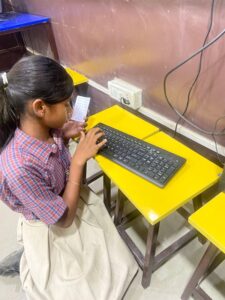
Lesley Keast, one of LightBeam’s earliest volunteers, reflects on the transformation she’s seen. “The children now have SOLE sessions in their learning DNA. They own the enquiry. They direct the wonder.” For her, the project isn’t just about teaching—it’s about being part of a global community stitched together by purpose. “Our WhatsApp and Facebook groups are more than admin tools. They’re our digital campfires,” she smiles.
Sometimes, it’s the smallest moments that leave the biggest marks. In one session disrupted by technical issues, Lesley recorded a video and sent it to the students with a few questions. They responded with videos of their own. One came from Ruby, a student who had never spoken during any session. With support from her peers, she sent a video back—radiant with confidence. “That’s when the ice cracked,” Lesley said.
In another session, students chose their own topics and returned with insights on dark matter and Freud. “We thought those were far beyond them,” Lesley said. “But with no ceilings, they soared.”
The LightBeam Project has no classrooms. And that’s its strength. By embedding itself into existing schools—like DIKSHA in Gurgaon—it stays grounded. DIKSHA, Monika shares, has been a pillar, ensuring support, space, and safety for these sessions. The absence of fixed walls creates a flexibility rare in educational systems. Sessions can happen anywhere children and curiosity meet.

The project’s growth depends on sustained partnerships—with schools, funders, and storytellers. “Support in storytelling,” Monika says, “goes a long way. Stories beam us into places we’ve never been.”
For teachers who feel trapped by rigid systems, Monika’s advice is gentle: Start small. Ask students what they’re curious about. Let them explore. Joy isn’t the enemy of rigour—it fuels it. And agency doesn’t create chaos. It creates connection.
Through The LightBeam Project, Monika Banga has redefined what education looks like in a post-pandemic world. Not transmission, but transformation. Not instruction, but invitation. Each call is a candle lit. Each question, a door opened. Each child, a beam of light—brighter than the last.
Education
University of Southampton Opens First Full-Fledged Foreign University Campus in India
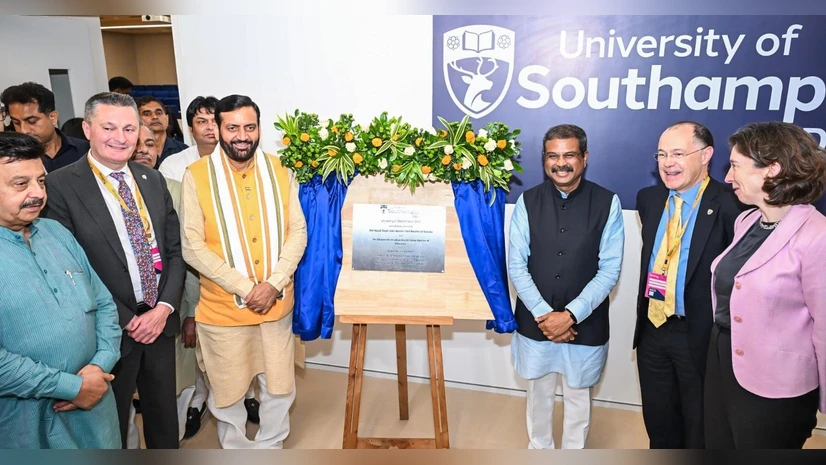
The University of Southampton has launched its fully operational campus in Gurugram, becoming the first foreign university to do so under the University Grants Commission’s (UGC) regulations.
The UK-based institution received its Letter of Intent last year and completed the campus within 12 months. Union Education Minister Dharmendra Pradhan and Haryana Chief Minister Nayab Singh Saini inaugurated the campus on Wednesday, calling it a milestone for NEP 2020 and the India-UK Roadmap 2030.
“This sets a precedent for internationalisation at home and for India’s vision of becoming a global knowledge hub,” Pradhan said.
Beginning in 2025, the campus will offer UK-aligned undergraduate and postgraduate programmes, including BSc degrees in Computer Science, Economics, Business Management, and Accounting & Finance, as well as MSc degrees in Finance and International Management. Students will also have the option to study up to one year at Southampton’s UK or Malaysia campuses.
Pradhan urged the university to introduce strong STEM offerings and focus on global challenges. Haryana CM Saini welcomed the initiative as a boost to Gurugram’s emergence as an education and innovation hub.
The university will recruit 75+ faculty members with international credentials. The inaugural student cohort includes candidates from India, the UAE, and Nepal.
Higher Education Secretary Vineet Joshi added that the UGC’s streamlined guidelines are enabling more such collaborations, helping position India as an attractive destination for international education.
The University of Southampton is a Russell Group institution and ranks among the top 100 universities worldwide. Its Gurugram campus is expected to strengthen India’s global academic ties and offer students a world-class, locally accessible education.
Education
Dancing Beyond Boundaries – The Story of Krithiga Ravichandran
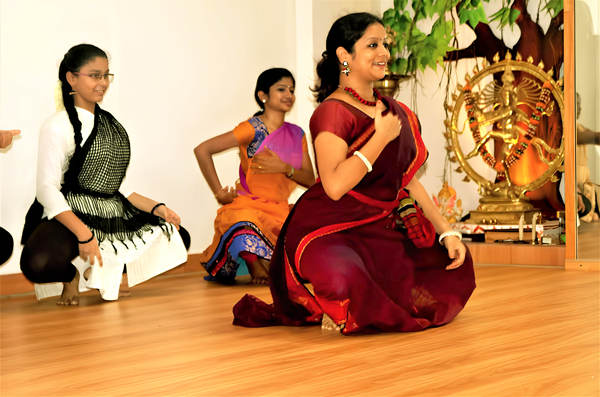
In the heart of Puducherry, where colonial buildings wear salt stains and stories, lives a woman quietly orchestrating a revolution — barefoot, graceful, and defiant. Krithiga Ravichandran, a Bharatanatyam dancer and Assistant Professor of Computer Science, moves between two seemingly different worlds. But look closer, and both are bound by the same rhythm — teaching, nurturing, and transforming.
Born into a family where the arts were heritage, not hobby, Krithiga was raised by the sounds of mridangam, violin, and Carnatic ragas. Her earliest memories? Her grandmother reciting jathis while tapping on a steel plate. “That was my first dance class,” she recalls. “No stage. Just the veranda and a heart full of movement.” By five, she was training formally in Bharatanatyam. And yet, even then, she saw how exclusionary the classical arts could be. The costs — of costumes, jewellery, music recordings — kept so many young girls out.
In 2014, on her birthday, Krithiga founded the Veer Foundation of Arts and Culture Trust, inspired by her father’s values of service. With it, she began offering free Bharatanatyam classes to underprivileged girls. These weren’t just lessons in movement, but in identity. Under temple porticos, community halls, and now small studios, these girls train rigorously — not to perform for others, but to discover themselves.
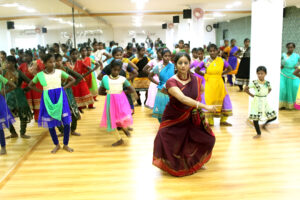
When she’s not dancing, Krithiga teaches Computer Science at Indira Gandhi Arts and Science College.
“Whether I’m breaking down a loop or a mudra, it’s the same joy — watching a student’s eyes light up.”
Her days begin with code and end in abhinaya. Yet, this rhythm energizes her — it’s how she lives her purpose.
Over the years, shy girls who once hesitated to speak now take the stage with confidence. Dance has offered them more than grace — it has given them resilience. “They come unsure,” Krithiga says. “But they bloom. They plan rehearsals, mentor juniors, manage logistics. They lead.” What begins as dance becomes training in leadership, storytelling, budgeting, and cultural memory.
Dancers in the Making, Leaders in the Wings
In a pioneering move, Krithiga introduced Bharatanatyam as a therapeutic tool inside Puducherry’s Central Prison. “It was experimental,” she admits. “But we saw remarkable change — calmness, awareness, even hope.”
Some questioned her decision. “Why offer sacred art to prisoners?” But she insists: “Who better to understand longing and repentance?” To Krithiga, art must include. Art must heal.
Creating safe, inclusive spaces for marginalised girls remains central to her vision. “They don’t just need a guru. They need a safe adult.” She counsels, supports, and makes sure no girl feels alone. From arranging transport to lending jewellery, she builds a circle of trust around them. Much of it runs on her own earnings. “If you believe in something, you fund it — with time, energy, and soul.”
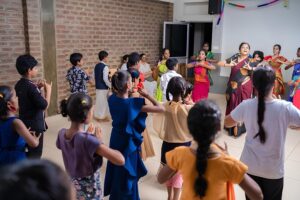
Though she receives small donations — old costumes, music books — she’s kept the work intimate and rooted. “Every piece of jewellery on stage has a story,” she says. “Someone’s daughter outgrew it, someone remembered their Arangetram. It’s a circle of generosity.”
“Dance Doesn’t Ask Who You Are. It Asks, How Do You Feel?”
Krithiga’s vision is to build a holistic centre for classical arts — with a stage, library, wellness wing, and space for reflection. “I don’t want to just train dancers. I want to raise artists — those who know the pulse of the past and can choreograph the future.”
To her, Bharatanatyam isn’t ornamental. It’s essential. A language of liberation — especially for those the world forgets to watch.
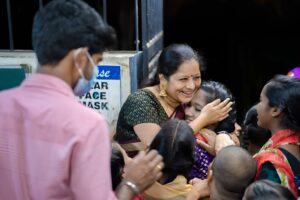
Education
NCERT’s New Class 8 History Textbook Addresses “Darker Periods”, Highlights Religious Intolerance and Resilience

The National Council of Educational Research and Training (NCERT) has released the new Class 8 Social Science textbook Exploring Society: India and Beyond for the 2025–26 academic session, marking the first time students are introduced to the Delhi Sultanate and the Mughal Empire at this grade level under the revised National Curriculum Framework for School Education (NCF-SE) 2023.
This new volume, aligned with the National Education Policy (NEP) 2020, takes a more direct approach in describing episodes of violence, religious conflict, and iconoclasm during the 13th to 17th centuries, while simultaneously including cautionary notes emphasizing historical context and contemporary responsibility.
A Shift in Framing Historical Conflict
In a departure from previous editions, the book explicitly refers to political instability, destruction of religious sites, and forced conversions during the Delhi Sultanate and Mughal rule. It discusses multiple invasions, plunder campaigns, and attacks on temples by rulers and generals such as Malik Kafur and Alauddin Khilji.
A newly added explanatory section, titled “A Note on Some Darker Periods in History,” outlines the rationale for such inclusions, stating the intent is to understand historical violence dispassionately and not attribute blame to present-day communities. The note reads, “Understanding the historical origin of cruel violence, abusive misrule or misplaced ambitions of power is the best way to heal the past and build a future where, hopefully, they will have no place.”
Focus on Mughal Rule: Blending Power with Faith
The chapter titled Reshaping India’s Political Map covers major developments under the Mughals, from Babur to Aurangzeb. Babur is depicted as both a cultured figure and a “brutal conqueror,” with references to his own writings about the aftermath of his military campaigns. Akbar is described as having a reign marked by “a blend of brutality and tolerance,” acknowledging both his early military actions and later efforts at interfaith dialogue.
Aurangzeb’s rule is discussed in terms of both religious motivations and political strategy. The book references farmans (imperial edicts) ordering temple demolitions and notes debates among scholars about his intentions.
While these sections document religious intolerance and violence, they are accompanied by recurring statements that urge students not to draw contemporary conclusions or apportion modern blame for historical events. One note reads: “Some of the invaders and rulers mentioned above committed terrible deeds and atrocities… but it is important to keep in mind that we, today, bear no responsibility for actions of individuals hundreds of years ago.”
Shivaji and the Marathas: Strategic Leadership and Cultural Identity
The subsequent chapter on the Marathas emphasizes Shivaji’s leadership, administrative innovation, and cultural contributions. He is portrayed as a leader who upheld his faith while respecting others and worked to restore desecrated temples.
According to the NCERT, these revisions are not simply textbook updates but part of a comprehensive overhaul that reimagines pedagogy and curriculum in light of NEP 2020. “Any comparison with the old syllabus and textbooks is therefore fruitless,” the NCERT said in a public statement.
Education
QS Rankings 2026: Delhi Named Most Affordable; Mumbai In Top 100 for Best Student Cities

The QS Best Student Cities 2026 rankings, released on July 15 by UK-based higher education consultancy Quacquarelli Symonds (QS), have placed Seoul as the world’s best city for students, overtaking London and Tokyo for the first time. However, the rankings also mark significant progress for Indian cities, particularly on the affordability and employment outcomes fronts.
India’s four largest metros—Delhi, Mumbai, Bangalore, and Chennai—all improved their positions compared to last year. Mumbai re-entered the global top 100, climbing 15 spots to rank 98th. Delhi rose to 104th, Bangalore to 108th, and Chennai reached 128th.
Among the standout achievements, Delhi has been ranked the world’s most affordable city for students, scoring 96.5 out of 100 on the affordability index. Mumbai (86.3), Bangalore (84.3), and Chennai (80.1) also featured among the top 15 globally in this category. The affordability metric assesses cost-of-living factors such as tuition, housing, and daily expenses.
The QS Best Student Cities Rankings are based on six key indicators: QS university rankings, student mix, desirability, employer activity, affordability, and student view. To qualify, cities must have a population exceeding 250,000 and host at least two universities featured in the latest QS World University Rankings.
India’s upward trajectory in the 2026 edition reflects both domestic education reforms and international recognition. Jessica Turner, CEO of QS, noted that the progress aligns with the goals of India’s National Education Policy (NEP) 2020, especially in promoting global engagement and student-centric learning. “In just ten years, India has seen a 390% increase in the number of universities featured in the QS World University Rankings,” she stated.
In the employer activity category, Delhi and Mumbai broke into the global top 50, signaling strong graduate employability. Bangalore registered the steepest climb, rising 41 positions to 59th, while Chennai jumped 29 spots, indicating the growing international credibility of graduates from these cities.
Global Highlights:
-
Seoul ranked #1 globally, followed by Tokyo (#2) and London (#3).
-
Munich and Melbourne rounded off the global top five.
-
A notable shift toward Asia is evident, with 39 cities from the Asia-Pacific region (excluding Australia and New Zealand) featured in the rankings. Among the 34 Asian cities listed in 2025, 26 improved their positions this year.
-
Other high-performing Asian cities included Kuala Lumpur (#12), Beijing (#13), and Taipei (#14), achieving their highest-ever rankings.
As India approaches the fifth anniversary of NEP 2020, the steady rise of its cities in global education indices suggests that structural investments in quality, accessibility, and employability are beginning to pay off. While challenges remain, especially in global perception and desirability metrics, the country’s metros are steadily carving a space in the international higher education map.
Education
From Classrooms to Boardrooms: Women Leaders Drive the Vision of Viksit Bharat
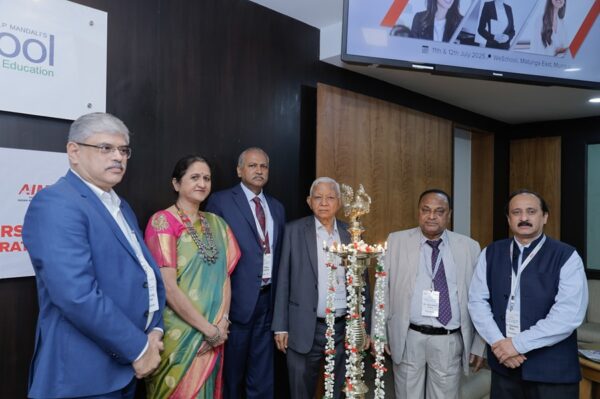
The summit on ‘Women in Leadership for Viksit Bharat’, jointly hosted by WeSchool, the Association of Indian Management Schools (AIMS), and Ratan Tata Maharashtra State Skills University, brought together a cross-section of stakeholders from governance, academia, and industry to discuss a crucial gap in India’s growth story: the underrepresentation of women in leadership roles.
At the heart of the discussion was a paradox: while women constitute 48% of India’s higher education enrollment, only a fraction make it to decision-making roles. For instance, just 9–10% of women reach boardrooms, and a mere 12% occupy leadership positions, despite 41% of the country’s higher education cohort being female. These figures, presented and reiterated throughout the summit, underscore a pressing concern — that India’s demographic dividend is incomplete without addressing its gender leadership gap.
The event positioned itself not just as a ceremonial gathering but as a call to institutional action. Leaders stressed that India’s journey toward becoming a Viksit Bharat (Developed India) by 2047 must be inclusive by design, not by default. That means policy, education, and workplace ecosystems must align to enable women from diverse socio-economic backgrounds to step into leadership roles.
The summit’s sessions explored key barriers — lack of access, socio-cultural constraints, gaps in mentorship, and the invisibilisation of women’s work in both formal and informal economies. There was also a strong focus on the role of skilling and education in building leadership capacity, particularly in sectors like STEM, administration, entrepreneurship, and governance.
Countries like Rwanda, Finland, and New Zealand were frequently referenced as case studies where inclusive leadership models have translated into stronger national outcomes — from better health and education indices to more equitable economies. India, speakers noted, has the talent pool — but it needs structural and cultural shifts to realise its full potential.
Prof. Dr. Uday Salunkhe, Group Director of WeSchool, pointed out: “While India sees 41% women in higher education, only 12% reach leadership roles — a gap we must urgently address. At WeSchool, we see education as a transformative force.”
Dr. Apoorva Palkar, Founding VC of Ratan Tata Maharashtra State Skills University, echoed that sentiment, highlighting that this isn’t just a gender issue — “It’s a missed opportunity for inclusive growth.” If women aren’t present at tables where decisions are made, she argued, “those decisions will never fully represent or benefit society at large.”
Government participation was also robust, with IAS officers including Mrs. Vinita Singhal, Mrs. Radhika Rastogi, and Mrs. Manisha Verma bringing grassroots perspectives on gender-inclusive policy design. Academic leaders like Dr. Ujwala Chakradeo and Dr. Upasna Agrawal discussed institutional reforms to embed leadership training early in educational pathways.
Industry voices such as Ms. Aarti Harbhajanka (Primus Partners), Dr. Tanaya Mishra (In-Solution Global Ltd.), and Ms. Poyni Bhatt (formerly of SINE–IIT Bombay) provided insights into how startup ecosystems and corporate governance structures can either accelerate or inhibit women’s rise to the top.
Throughout the summit, one theme remained constant: India cannot afford to exclude half its population from the leadership narrative. The path to a developed India must be paved with inclusive leadership, and that means reimagining how women access, navigate, and shape systems of power and progress.
The summit concluded with a shared resolve: to turn dialogue into design, and design into durable change. If Viksit Bharat is the destination, women’s leadership is the vehicle that can drive us there — faster, fairer, and stronger.
Education
The Man Who Called His Students Gods: Dwijendranath Ghosh
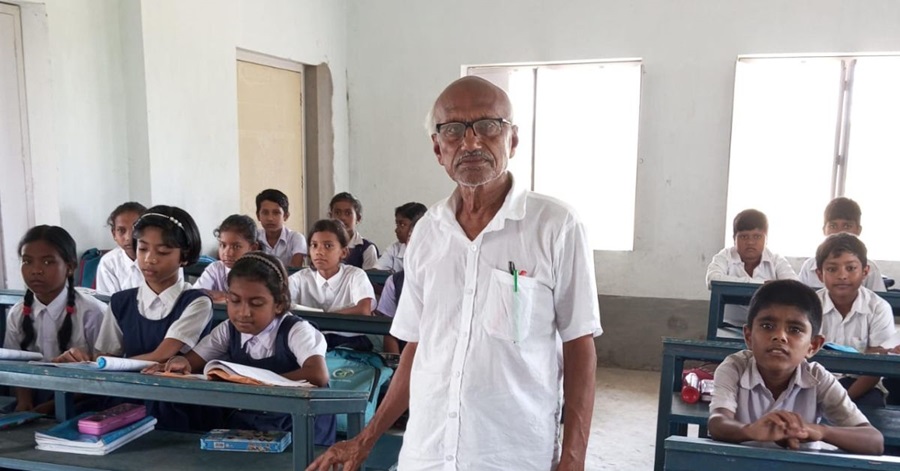
Dwijendranath Ghosh calls himself ordinary.
But how many “ordinary” people spend their retirement building a school from scratch — with no funding, no government salary, and no promise of support? How many choose to teach every day, without compensation, well into their 70s? And how many refer to their students — many from the most marginalised sections of rural Bengal — as gods?
At 78, Ghosh is the heart and soul of Basantapur Junior High School in West Bengal’s Hooghly district. He opens the gate each morning. He teaches children for free. He never left his village — but his impact now reaches far beyond it.
From Barefoot Dreams to Blackboards
Ghosh’s journey is rooted in personal struggle. Growing up in deep poverty, he had no books, no uniforms, and no certainty. His childhood was spent walking barefoot to school, borrowing textbooks, and studying by the glow of kerosene lamps. And yet, he rose. A master’s degree from Burdwan University followed in 1973.
“The pain of those days still haunts me,” he says. “But it also shaped me.”
That pain turned into purpose. Soon after graduating, he and a few friends began running an informal high school in their village—unrecognised, unpaid, but unstoppable. For nine years, they taught with nothing but commitment. When the government finally recognised the school in 1982, Ghosh had already left to take a government job elsewhere, forced by financial needs.
The Second School
He retired in 2008. But instead of resting, he returned to his village and found that little had changed. Girls were still dropping out after primary school. Child marriage was common. A generation was fading into invisibility. So he began again. With no funding, no building, and no staff, he worked for five years to create Basantapur Junior High School.
In 2014, the school was officially recognised. But the journey was never about the paperwork — it was about presence. Every morning, Ghosh arrives before the first bell. He teaches, supports, and uplifts — without compensation. Because for him, teaching is service.
A Volunteer Army — Running on Faith
He’s not alone. A team of young, educated, but unemployed volunteer teachers stands beside him. They could have chosen easier paths, but chose this one out of belief, not benefit. They are unpaid. At times, local donors offer small stipends, but it’s inconsistent. Most are struggling, yet they return every day. “They have given the most valuable years of their lives,” Ghosh says.
The school receives only ₹25,000 a year as a government grant. For three years, even that was inaccessible. What kept it alive? Former students, now grown, are donating what they can. The community is pitching in. Alumni returning to teach. When a government teacher recently disrespected the volunteers, the team almost walked out. But students and parents wouldn’t let them. Ghosh stepped in to calm tensions.
“We can’t let one bad moment undo decades of good,” he told them.
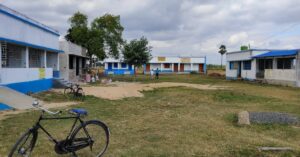
A Temple Against Child Marriage
One of the school’s biggest challenges is child marriage. In villages like Basantapur, girls are often married by 14—seen as burdens, not futures. By offering local access to education, the school has become a shield. Many girls have completed higher education here. But the battle continues. “This trend,” Ghosh says, “is like an infection. It keeps coming back.”
At Basantapur Junior High School, learning is about more than grades. Students perform in cultural shows, play football and cricket, and take part in morning assemblies. They learn to speak, to lead, to dream. There’s no structured life skills module—because the school itself is the life lesson. Students know they are seen, heard, and cared for. Teachers know their work matters. And visitors walk away knowing this is not just a school—it’s a movement.
His empathy, his daily discipline, and his belief in every child form the blueprint that his students follow. And his impact lives in their dreams.
The Final Lesson
What does his family think?
“They worry about my health,” he laughs. “Not about the money.”
His pension is enough for his needs. What he seeks is not comfort — but recognition for his team. “These teachers have earned the right to be made permanent. A hundred times over,” he says.
When asked what keeps him going, he simply says:
“So long as I am in the school, I am alive.”
In an education system obsessed with metrics, Ghosh offers something rare: meaning.
He didn’t build a career.
He built a sanctuary.
He didn’t earn a salary.
He earned generations of gratitude.
And in every child who enters Basantapur Junior High, the final lesson is quietly imprinted:
Service is not sacrifice. It’s grace.
Education
NCERT Launches New Class 5 & 8 Textbooks, Makes Art Education Mandatory
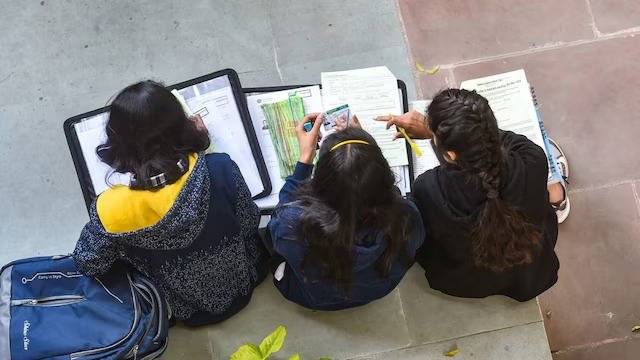
The National Council of Educational Research and Training (NCERT) has launched a new set of textbooks for Classes 5 and 8 for the 2025–26 academic session, designed in accordance with the National Education Policy (NEP) 2020 and the National Curriculum Framework for School Education (NCF-SE) 2023. This marks a significant shift in India’s school education approach, with a renewed focus on creativity, scientific temper, skill development, and values rooted in Indian heritage.
The new Class 8 textbooks include Curiosity (Science), Kaushal Bodh (Vocational Education), Poorvi (English), Malhaar (Hindi), and Kriti (Art Education). For Class 5, the newly introduced books are Santoor (English) and Veena (Hindi). Designed with simple language and rich visuals, these books aim to spark curiosity while enhancing concept clarity.
Among the highlights is Curiosity, the Class 8 science book that covers topics across physics, chemistry, and biology through real-life examples and activity-based modules. It includes dedicated chapters on COVID-19 vaccine development, India’s space missions like Chandrayaan, Ayurveda, and the Make in India initiative—positioning science education within the context of India’s modern achievements.
Kaushal Bodh introduces students to skill-based learning, preparing them for real-world employment and entrepreneurship. Poorvi, the Class 8 English book, presents stories based on the lives of national icons such as Major Somnath Sharma, Verghese Kurien, and physicist Bibha Choudhary to inspire values like courage and innovation.
In a landmark move, art education has been made compulsory. Kriti brings music, drama, and theatre into the mainstream classroom, as recommended by NEP 2020. This initiative aims to nurture creativity across disciplines, allowing children to express themselves beyond textbooks and tests.
For younger learners, the new Class 5 books Santoor and Veena adopt an activity-based learning model that promotes language acquisition through stories, songs, and play—departing from rote methods to make early education more engaging.
Despite enthusiasm from schools and parents, distribution has seen some hurdles. Reports indicate limited stock availability on platforms like Amazon and in local stores. Many parents and educators are urging NCERT to make digital versions of the books available in PDF format. NCERT has acknowledged the demand and plans to print over 15 crore copies to meet nationwide needs. Partnerships with e-commerce platforms are also being explored to streamline delivery.
This new textbook rollout is part of a broader national effort to reimagine the Indian classroom—rooted in local knowledge, focused on real-world skills, and responsive to 21st-century learning needs.
Education
US Embassy Tightens Social Media Checks for Student Visas

The U.S. Embassy in New Delhi has intensified its vetting process for applicants of F, M, and J non-immigrant visas by requiring disclosure of and public access to social media accounts used over the past five years. Under the updated rules, all social media handles—including Facebook, Instagram, Twitter, LinkedIn, TikTok, Reddit, and others—must be listed on the DS‑160 form, and profiles must be set to public during the visa screening process.
Consular officers are explicitly authorised to review candidates’ public posts, comments, and shares—and may even check private messages—to assess “hostility toward the United States” or support for extremist or anti‑U.S. content. Failure to comply, misrepresent information, or omit an account can result in visa denial and bar future visa eligibility.
This update forms part of a broader expansion of screening procedures initiated in June. Diplomatic posts worldwide paused student visa interviews to implement the new protocol, which treats every visa decision as a “national security decision”. The U.S. Embassy in India also recently issued a reminder via X, stating continuous monitoring of visa holders is in effect and violations of U.S. laws—even after visa issuance—can result in revocation and deportation.
These changes reflect the U.S. administration’s emphasis on enhanced national security and combating visa fraud. While some students and immigration advocates have raised concerns about privacy and freedom of expression, the Embassy stresses that visa screening is an ongoing process. Indian students and other applicants are advised to review their online activity and ensure transparency with their DS‑160 submissions.
Education
A School Without Walls: The Pehchaan Story, Led by Akash Tandon
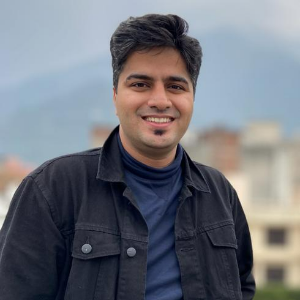
Sometimes the biggest change begins with the smallest act — a few mats on the ground, five curious children, and a group of young volunteers refusing to look away.
In the heart of Delhi, just steps away from the WHO headquarters and the grandeur of Lutyens’ Delhi, an open drain separates two vastly different worlds. On one side: embassies, privilege, policy. On the other: a slum of over 10,000 people, where childhood is often lost to labour, illness, and invisibility.
It’s here that Pehchaan — The Street School — took root.
“We knew we couldn’t change the world. But we could change someone’s world.”
For co-founder Akash Tandon, Pehchaan wasn’t part of a five-year plan. It was a response. A moment of reckoning, watching children play in a toxic drain, unaware of the danger. “This isn’t water,” they told the kids. “It’s poison.” The kids laughed.
That laugh stayed with them.
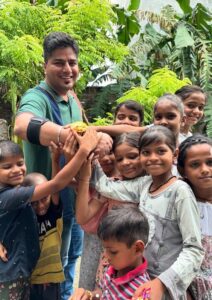
So Akash and his friends returned. Not with speeches or slogans — but with notebooks, mats, and the stubborn belief that every child, no matter their address, deserves to learn.
What started as a weekend effort with five students has now grown into a network of 10 centres, reaching over 1,600 children. And yet, Pehchaan remains fiercely grassroots — no paid staff, no office, no formal backing. Just a living, breathing movement powered entirely by volunteers.
Education That Heals
Pehchaan doesn’t just teach. It listens. It adapts. It believes that the first step to learning is dignity — and that means personalised mentorship, trust, and a curriculum that sees the child beyond the textbook.
Children are grouped into three learning tracks: those already in school who need support, dropouts looking to rejoin, and first-time learners who’ve never stepped inside a classroom. The model is lean but layered — with low student-volunteer ratios, personalised goals, and modules that blend academics with life skills.
There’s dance, storytelling, debate, and painting. There’s coding and digital literacy. And there’s space to be seen.
“My school encouraged me to sing, speak, perform,” says Preeti Adhikari, a longtime Pehchaan volunteer. “These children deserve that too. Because it’s not just about marks — it’s about confidence.”
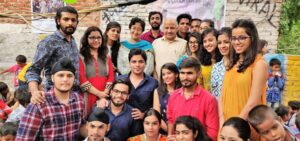
From Drain to Degree
One story stays close to Akash’s heart.
A boy joined Pehchaan in Class 3. He faced pressure to drop out and start working. But he stayed. Pehchaan gave him academic support, counselling, and community. He completed Class 12 with 86%. Then cracked the Delhi University entrance exam.
But the resistance didn’t stop. “What will you earn from books?” neighbours asked. Still, Pehchaan raised the funds, got him into college — and today, that boy teaches at the same centre where he once sat as a student.
“He’s the proof,” Akash says. “That this works. That this matters.”
A System That Runs Without a System
Despite being volunteer-run, Pehchaan operates with the discipline of a corporate team. Every 10 teaching assistants report to a centre head. Weekly reports are filed. Interns handle HR, design, digital media, and curriculum — all without salaries.
In 2024 alone, 8,000+ interns from 75+ colleges joined hands with Pehchaan. Many now lead verticals, train others, or launch their own community learning spaces.
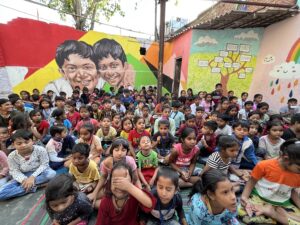
“Earlier I taught five kids,” one intern said. “Now I’m hiring 30 volunteers who each teach five. That’s impact at scale.”
The community, too, is beginning to notice. Blanket drives, nutrition partnerships, and the newly launched Digital Literacy Lab — built with scrap funding and donated laptops — have brought a sense of permanence to the pop-up classrooms.
But the hardest barrier? Still parents.
“You show up for 10 years — then they believe you.”
Convincing slum families to send their children — especially girls — to informal schools was a long battle. Many children still get married by 14. Others are pushed into work.
But when the same group of volunteers keeps returning, year after year, in sun, rain, or smog — trust begins to grow. “We’ve moved beyond convincing now,” Akash reflects. “We’re building the next layer. It’s about dignity.”
Girls who once never stepped outside now give public speeches. Boys once caught in addiction now mentor others.
Akash is clear about the goal: “We don’t want to go pan-India. We want 50 other Pehchaans to emerge. That’s how you scale — by letting go.”
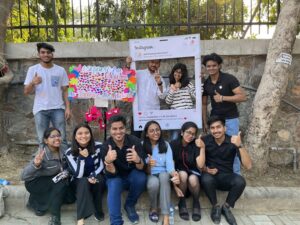
Read the full story in our latest issue, Teacher Warriors 2025.
-

 Education2 months ago
Education2 months agoCBSE’s ‘Sugar Boards’ Initiative: Tackling the Sweet Crisis in Indian Schools
-
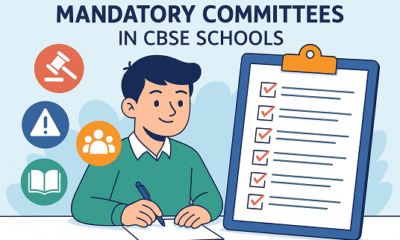
 Education3 months ago
Education3 months agoIs Your School Following These Mandatory CBSE Committees?
-
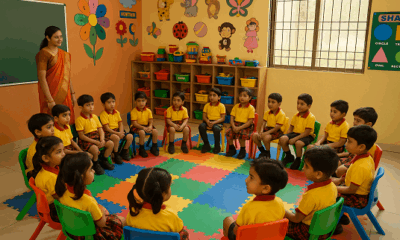
 Education3 months ago
Education3 months agoMaharashtra to Regulate Pre-Primary Education with New Law Aligned to NEP 2020
-
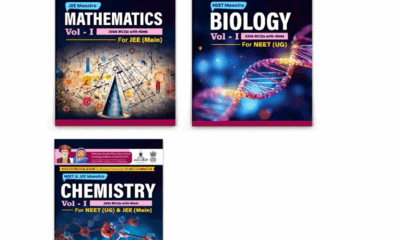
 Education3 months ago
Education3 months agoMAHAJYOTI’s Book Distribution Scheme to Empower 7,000 OBC Students Preparing for JEE/NEET & MHT-CET
-
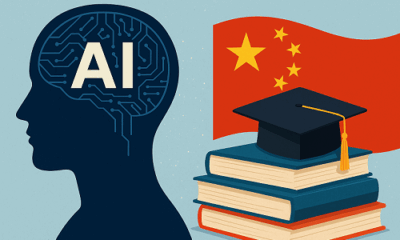
 Education3 months ago
Education3 months agoChina Embarks on Ambitious AI-Driven Education Reform to Build a ‘Strong Education Nation’ by 2035
-
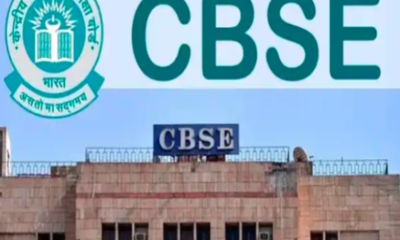
 Education3 months ago
Education3 months agoCBSE Introduces Mandatory Bridge Course for Classes 6 to 12 in Chhattisgarh Under NEP 2020
-
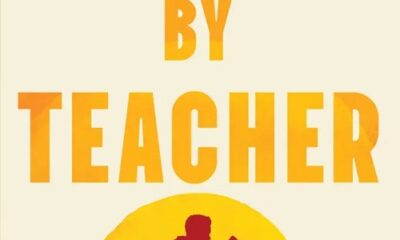
 Education2 months ago
Education2 months agoJohn King’s Book ‘Teacher By Teacher’: A Global Tribute to the Transformative Power of Education
-
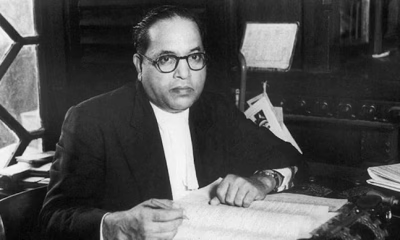
 Education3 months ago
Education3 months agoRewriting Ambedkar: Why Students Must Know the Man Beyond the Constitution
-
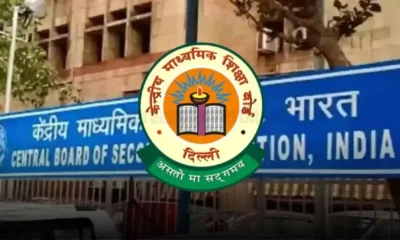
 Education3 months ago
Education3 months agoCBSE Mandates 50-Hour Annual Training for Teachers, Declares STEM as 2025 Theme
-
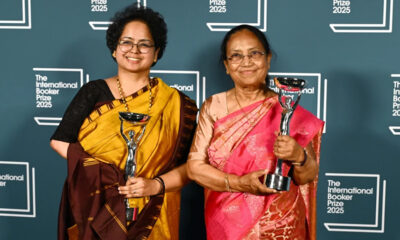
 Education2 months ago
Education2 months agoBanu Mushtaq’s International Booker Win Is a Wake-Up Call for Indian Schools to Reclaim Literature




